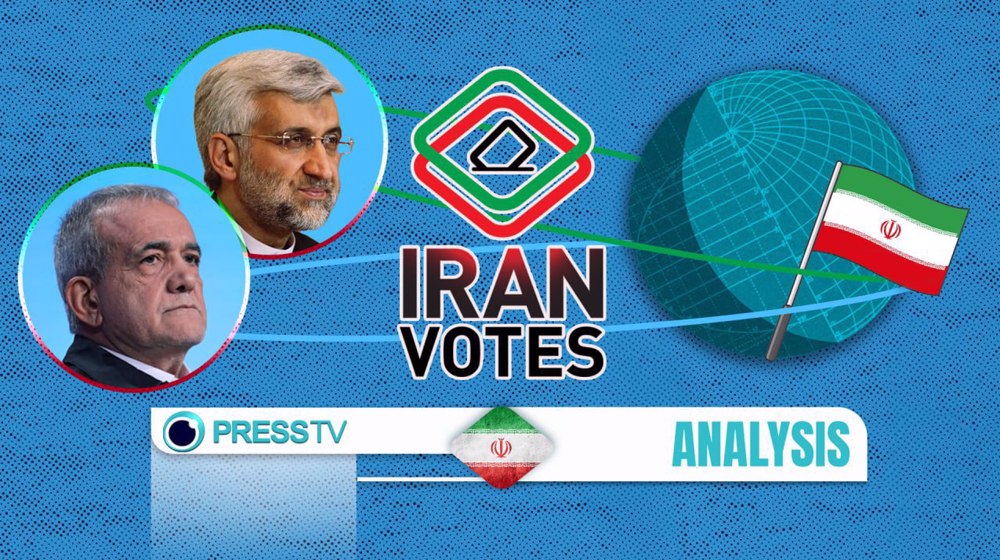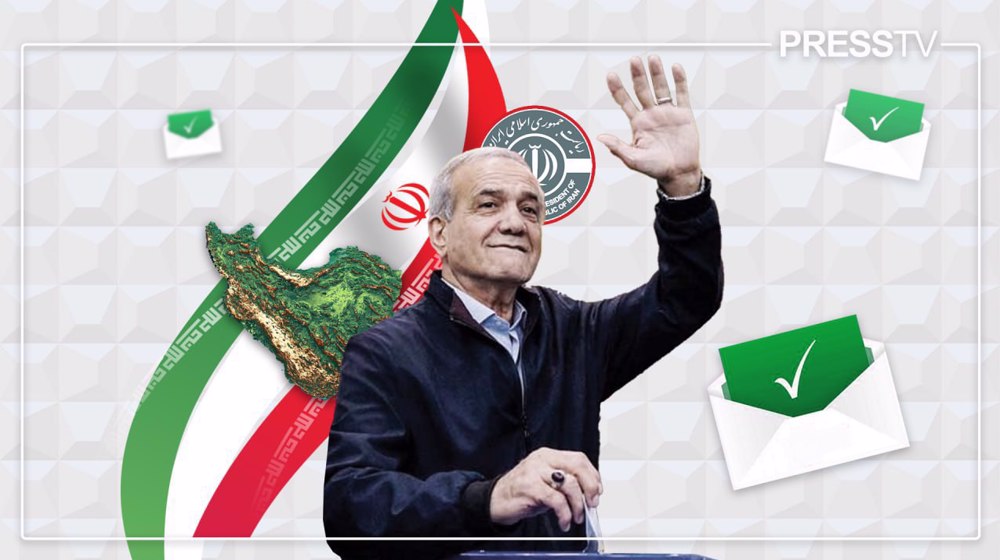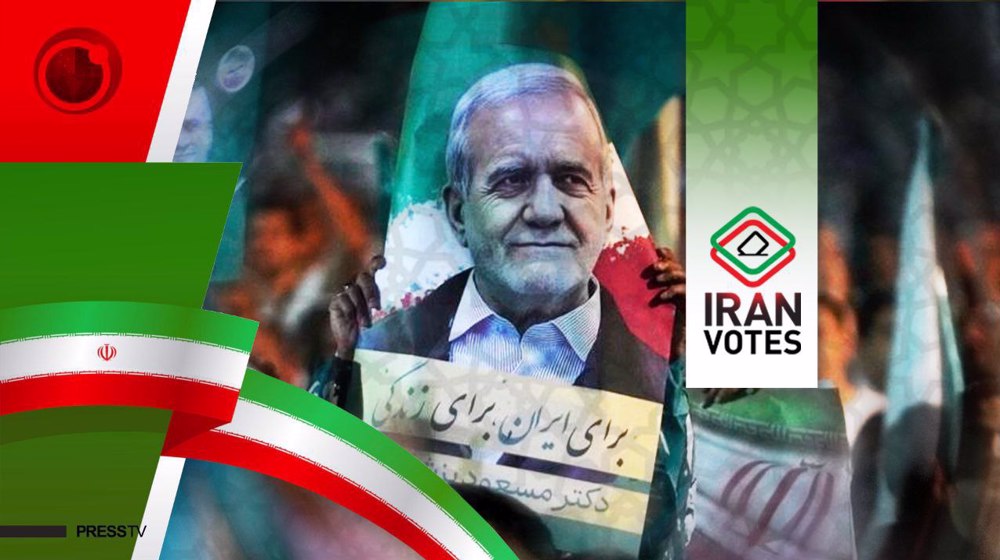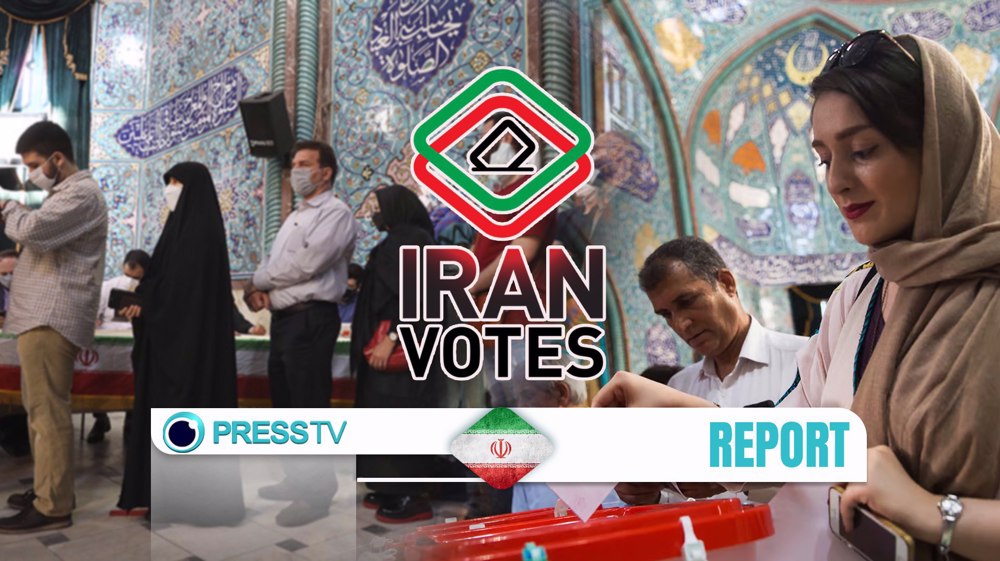Experts Speak: How should Iran's foreign policy under new president look like
By Alireza Akbari
As the two candidates gear up for the presidential run-off election on Friday, a key area of focus that will determine the outcome of the vote is foreign policy.
Both Masoud Pezeshkian and Saeed Jalili have elaborated on their foreign policy blueprints in two back-to-back presidential debates and other campaign events, each vowing to boost engagement with the world, albeit with different plans and approaches.
Speaking to the Press TV website, political analyst and senior journalist Mohammad Ghaderi said Pezeshkian should adopt a "balanced approach" to foreign policy.
Ghaderi highlighted the need for an approach that balances relations between the West and East, as well as between domestic and international interests.
Referring to the general foreign policy of the Islamic Republic, Ghaderi said the principles are clear, emphasizing the importance of pursuing relations with nations that align with Iran's national interests.
He added that the incoming president must also uphold the country's foreign policy strategy concerning the Axis of Resistance.
During his campaign, Pezeshkian pledged to bolster diplomatic and economic engagement with the world, including the West, and showed interest in pursuing talks to salvage the 2015 nuclear deal, which has been put on the back burner due to American policy of procrastination.
Ghaderi stated that the veteran lawmaker and former health minister is likely to follow a similar tactical approach to foreign policy as that of Hassan Rouhani's government, which signed the nuclear deal with the West in 2015.
However, he warned that repeating past strategies could be a "strategic error."
Shifting balance of power
Iran, Ghaderi noted, currently finds itself in a position where it is not inclined to revisit past dynamics, nor is the West in a position to engage with Iran from the same standpoint.
"This reflects a strategic shift in Iran's position within the international system, both regionally and globally," Ghaderi remarked.
Regarding recent diplomatic overtures from the West to Iran, the analyst highlighted a shifting balance of power, citing an instance where Western nations communicated with Tehran through a series of messages, urging it to exercise restraint following the attack on the Iranian consulate in Damascus.
He interpreted these messages as indicators of changing dynamics in the international order, pointing to newfound respect for Iran's stature as an important global player.
Ghaderi said it was unprecedented for the US to appeal to Iran for restraint in its retaliatory military action against the Israeli regime over the attack on the Iranian consulate in Syria and the martyrdom of senior commanders.
He acknowledged the success of President Raeisi's neighborliness policy and Eastward focus, suggesting that if Pezeshkian continues on the same path, there will be progress in Iran's foreign policy agenda.
Hakimeh Saghaye-Biria, an academic and political analyst, shed light on the foreign policy agenda of Pezeshkian's rival, Jalili.
She said the former lead nuclear negotiator understands that the world is transforming from a West-centric unilateral world order to a multilateral world order, in which non-Western countries play an important role in shaping new realities.
The role of Iran, she added, is "very much appreciated" in this time of change.
Approach to independence
A maximalist approach to independence, said Saghaye-Biria, "is basically looking at independence as a process that is multilayered."
"On the first layer, you have the notion that independence is part of the belief in monotheism. This is the first layer, an ideological one that explains the mentality of what independence means," she stated.
"Then we have the operationalization of this independence, which is based on the empowerment of Iran on both the national and international levels."
The university professor said, at the national level, the incoming president has his task cut out - to empower the country in different spheres, including the economy, politics, technology, science, and political cohesion.
"All of this is part of independence. You have to have a country that looks towards empowerment in a way compatible with that maximalist approach to independence, which tries to do so independently of global powers who pressure you into submission," she said.
"Of course, it is understood that internal or national empowerment is impossible in isolation."
Saghaye-Biria further stated that another layer is the idea that you cannot be independent unless you manage your relations with the outside world smartly, maximizing your position vis-à-vis others.
"What you have to do is manage your foreign relations in a way that maximizes independence outside. So you want to have a region that moves towards less and less foreign intervention," she stressed.
"That is one of your goals of foreign policy. So in this sense, if Iran wants to achieve that goal, it has to try to expand the resistance front, which operates within the region that Iran is in (West Asia)."
Expanding the resistance front
On Jalili's foreign policy, she said one of his goals, like it was for President Raeisi, is to expand the resistance front with the aim of reducing foreign influence in the region.
"There are developments unfolding in our region that make this goal more and more achievable because of developments in Palestine, growing anti-Zionist sentiment, and all the things that have happened since the genocidal war was launched on Gaza," the academic stated.
"All these developments have put the US in a very difficult situation because the majority of people around the world find the US responsible for what the Israeli regime is doing in Gaza. So this becomes one part of how foreign policy should be managed."
On the economic front, she added, a maximalist independent foreign policy means "expanding economic relations with non-domineering powers, including non-Western rising powers."
During President Raeisi's administration, this was carried out through Iran's joining of BRICS and the Shanghai Cooperation Organization (SCO) and the expansion of relations with neighbors, a policy that is also part of Jalili's foreign policy agenda.
She noted that to achieve the maximalist approach to independence, both domestic and foreign policy fronts should be in consonance to make the Islamic Republic a strong independent country.
Invoking the Islamic Republic of Iran's Constitution, Saghaye-Biria said "independence" is a central element enshrined in it.
"We have Article 152 that talks about how Iran is supposed to be independent, which not only prevents any sort of dominance by foreign powers but also avoids domineering posturing in foreign policy," she noted.
"It also talks about protecting the rights of the oppressed around the world, including Muslims. So it is a complex foreign policy vision in terms of independence that has both national elements as well as regional and international elements," the analyst said.
For anyone who assumes the office of the country's president, she noted, the first responsibility also mentioned in the Constitution "is to execute the Constitution and be the protector of the Constitution."
Israeli forces kill 7 more Palestinians in West Bank
Israel’s Netanyahu dismisses military affairs minister Gallant
Hezbollah attacks turn Israel’s Haifa into a ghost town
Iran’s FM meets Pakistani PM, discusses bilateral ties, Israeli atrocities
Iran ramps up gasoline output amid rising demand
UK foreign secretary under pressure over denial of genocide in Gaza
VIDEO | Press TV's news headlines
Hezbollah bombards explosives factory in occupied territories










 This makes it easy to access the Press TV website
This makes it easy to access the Press TV website